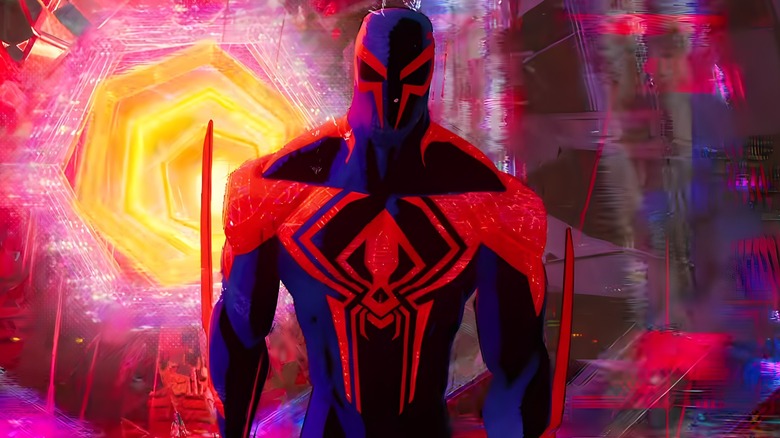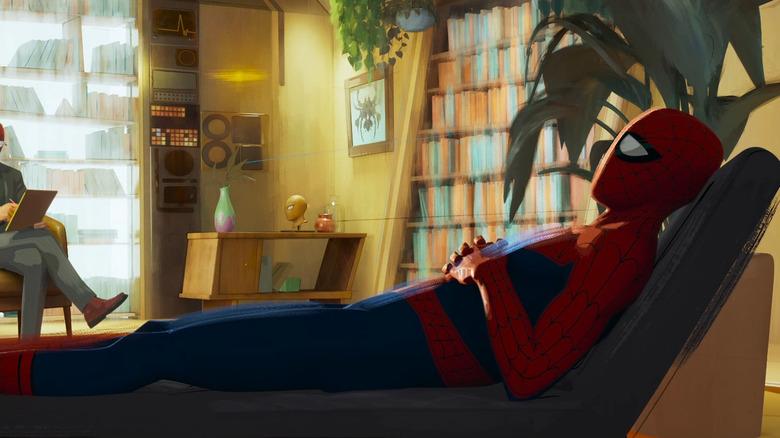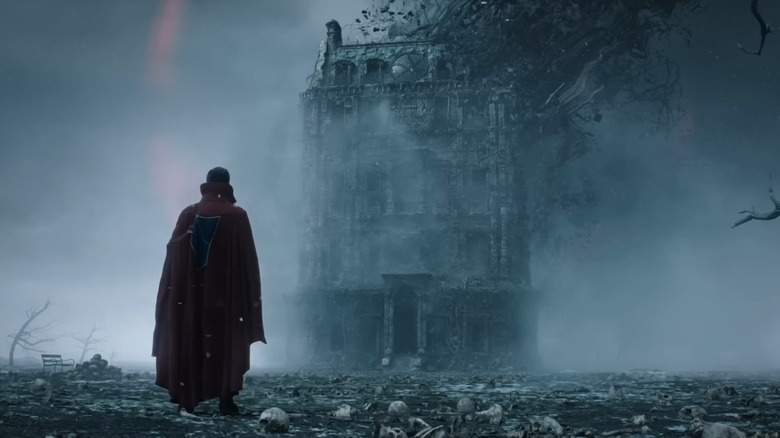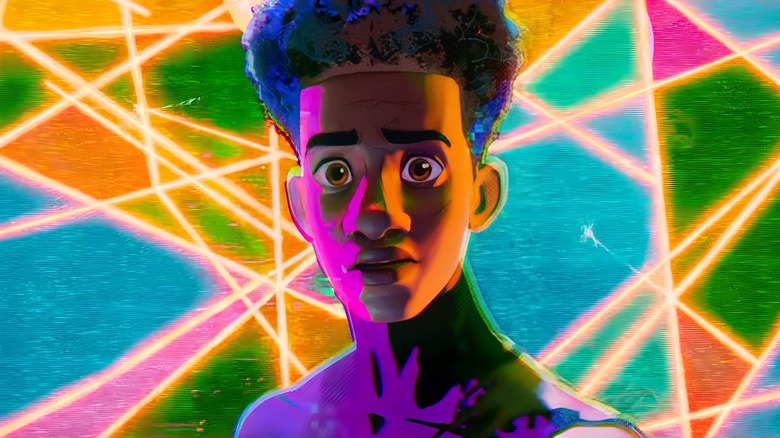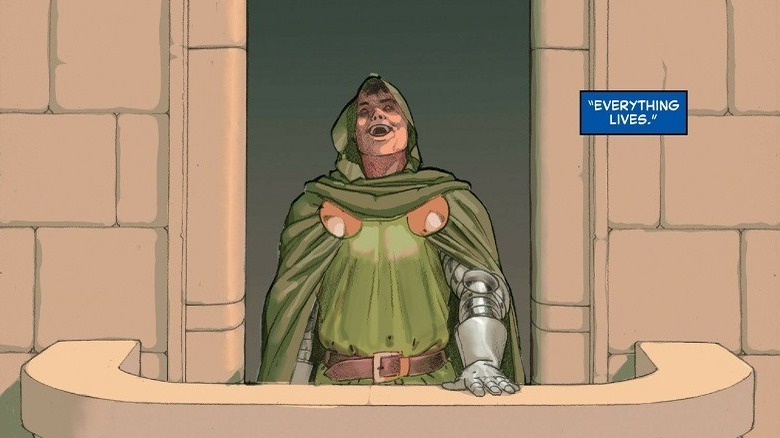Spider-Man: Across The Spider-Verse Has Massive Implications For Loki Season 2
Talk about a "Multiverse of Madness." Sony Pictures Animation's sequel "Spider-Man: Across the Spider-Verse" not only breaks new ground in the superhero genre and defies expectations, but it also defies corporate boundaries to break the understanding of the Marvel multiverse at large.
As seemingly established in "Spider-Man: No Way Home," all Marvel movies — at least those in the Marvel Cinematic Universe and those released by Sony Pictures — co-exist in the same multiverse, with every iteration of the titular web-slinger just a spell away from one another. While "Across the Spider-Verse" doesn't violate the guidelines set in previous Marvel multiverse romps, it does build upon them in ways that could affect the MCU's defining multiverse project — the Disney+ series "Loki."
"Loki" Season 2 is set to premiere in October of this year, and Season 1 outlined how the multiverse works, grows, and is maintained across all Marvel properties. Its mind-blowing first-season finale lightly casts doubt on the stringency of these rules, as the mastermind behind the multiversal maintenance turns out to be an unstable Kang variant known as He Who Remains (Jonathan Majors). Where "Loki" pulled the rug out from audiences in terms of their understanding of the multiverse, "Spider-Verse" introduces new rules that are seemingly unimpeachable, especially in regards to the film's defining mechanic — canon events.
What is a canon event and how do they work?
A canon event is a moment in a Spider-Person's lifetime that is consistent across all variants in the Spider-Verse and cannot be changed without risking total universal destruction. This includes tragedies like the death of a loved one. When this concept is explained at the Spider-Society headquarters, a hologram shows an image that looks similar to "Loki's" branching representation of the multiverse.
Interestingly enough, an eerily similar concept is introduced in the Disney+ animated series "What If...?," referred to by Uatu the Watcher (Jeffery Wright) as "absolute points." The first absolute point delineated as such is the death of Christine Palmer (Rachel McAdams) in the episode "What if... Doctor Strange Lost His Heart Instead of His Hands?" Over the course of the story, viewers see that absolute points are nearly impossible to change without some sort of multiversal intervention.
When Doctor Strange Supreme (Benedict Cumberbatch) manages to do just that, his world begins to dissolve into blackness. Despite a difference in vocabulary, the consistency of how the destruction of a universe is depicted across different projects, universes, and studios could point to an interconnectivity that fans have yet to appreciate.
What if all of these events are actually incursions?
In "Across the Spider-Verse," Miles Morales (Shameik Moore) inadvertently shows fans what a decaying universe looks like when he saves the life of the police captain of Pavitr Prabhakar's (Karan Soni) Earth-50101. The eerie, all-consuming blackness bears resemblance to a similar event in "What If...?" and "Doctor Strange in the Multiverse of Madness." This could mean that in every universe, what audiences see is the inter-universal apocalypse known as an incursion.
Assuming that's true, "Spider-Verse" confirms how an incursion occurs. By violating the boundaries between universes, Miles and Doctor Strange unintentionally altered canon events/absolute points, which led to their universe's collision with another universe. Though this newfound specificity is small, it creates guidelines that, going forward, could change how heroes and villains deal with the Marvel Universe's newest overarching threat. "Spider-Verse" specifically presents a key that could save the entire Marvel multiverse in the near future.
Could Miles Morales save the multiverse?
Until "Across the Spider-Verse," the only beings capable of traversing the multiverse intentionally were Loki (Tom Hiddleston), the rest of the Time Variance Authority, the Watcher, America Chavez (Xochitl Gomez), Wanda Maximoff (Elizabeth Olson), and certain Doctor Strange variants. Now, there is a seemingly infinite number of Spider-People that possess the ability to travel the multiverse and seemingly prevent incursions.
As seen on Earth-50101, Miguel O'Hara (Oscar Isaac) and his team are able to keep the blackness at bay by arriving on the scene immediately. This is a skill that neither Doctor Strange nor "Loki's" TVA have been able to pull off. As the second season of "Loki" continues to explore and elaborate upon how the multiverse works, it will likely come up against the subject of incursions and how they are caused.
Theoretically, the aforementioned events are incursions and are being portrayed with intentional consistency that could lay the groundwork for Marvel's God of Mischief to discover a way to prevent incursions himself, thus staving off the inevitably messy aftermath of Kang's meddling in the multiverse. It would be a fitting end to the character's story, as he learns how to maintain order without the quasi-murderous ideologies of Miguel O'Hara and He Who Remains. Instead of pruning, Loki could stimulate growth.
Everything lives...
On the final page of Marvel's 2015 story "Secret Wars," Reed Richards claims he, "used to believe in universal contradiction. Entropy and the end of all things ... Now, I believe in expansion. I believe we endure ... Everything lives." This sentiment, expressed at the close of an era of unprecedented manipulation and loss, would be the perfect summation of where The Multiverse Saga should leave the Marvel multiverse.
Narratively, it represents the polar opposite of The Infinity Saga's ethos, which communicated that victory demands sacrifice. As skillfully and beautifully as this message is conveyed, it would be fitting for the new era of the Marvel multiverse to usher in something different by embracing the fantastical ability for comic book stories to evolve beyond reader's wildest imaginations without rote nihilism.
To look at things from an even more "meta" perspective, such a tonal shift would pave the way for a more diverse Marvel multiverse no longer constricted by the continuity or the stylistic and narrative homogeny of the MCU. The perfect place to set up this much-needed shift would be in films like "Across the Spider-Verse" and TV series like "Loki," which tell stories about the wonders of expanding worlds and the potential beauty of creative evolution.
